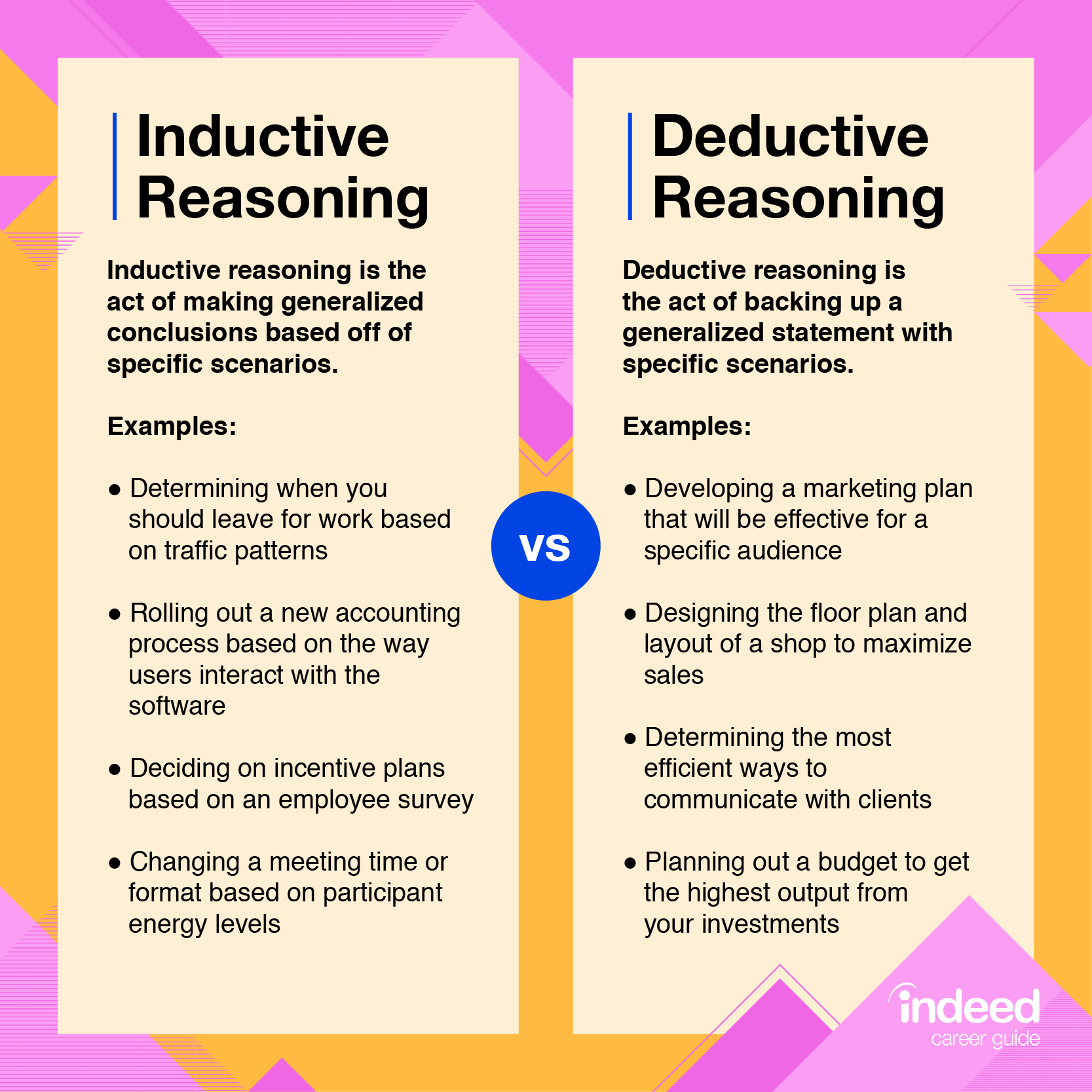How do you use deductive reasoning. Now lets look at a real-life example.

Exactly This I Recall A Lecture In Philosophy On The Differences Between Inductive And De Inductive Reasoning Reasoning Activities Logic And Critical Thinking
There are three major types of deductive reasoning we can use to test deductions.

. Compare inductive reasoning with deductive reasoning. Deductive reasoning is the ability to process statements and reach a logical conclusion based on those statements. Deductive reasoning moves from the general rule to the specific application.
You might use inductive reasoning when attempting to understand how something works by observing patterns. If x 4 And if y 1 Then 2x y 9. In deductive reasoning if the original assertions are true then the conclusion must also be true.
Deductive reasoning is a type of logic where general statements or premises are used to form a specific conclusion. For example A is equal to B. Describes the relationship between conditions If then In continual reasoning what are the possible outcomes.
Deductive reasoning on the other hand might be. A common example is the ifthen statement. Deductive reasoning is an important skill that can help you think logically and make meaningful decisions in the workplace.
The premise is used to reach a specific logical conclusion. In science deductive. A deductive argument is an argument in which it is intended that the conclusion logically follows from the premises.
ENVR 1402 Dr S Lecture 2 Part 1 Answer the following questions using the online Environmental Biology textbook. A valid argument is one in which there is no possible way for the premises to be true and the conclusion false. Based on what you have read in the text the lecture and any other sources you find helpful to your understanding of deductive arguments explain the structure of a deductive argument in your own words.
Describe what the environment is and some of its major components. It is when you take two true statements or premises to form a conclusion. Go to the box Deductive Reasoning in the beginning of Chapter 8.
What is absolutely true- Deductive Reasoning-What is observably most true- Inductive Reasoning. Most common kind of deductive reasoning. You need to draw this distinction in order for it to be meaningful to say things like this is a valid deductive argument or this is an invalid deductive argument which is a pretty.
12ptParagraph BIUA 2 Tv. As described in lecture deductive reasoning is used when you Either complete a word search or form a hypothesis about behavior based on many specific observations A man reports being completely blind but his actions suggest that he can navigate his way around the furniture in. Inductive reasoning relies on patterns and trends while deductive reasoning relies on facts and rules.
In my presentation for the 2010 Meador Lectures on Rationality I chose to compare legal reasoning and scientific reasoning. Deductive reasoning is a type of deduction used in science and in life. A marketing manager wants to attract more people in the 18-24 age bracket to his companys website.
Deductive reasoning lets you organize premises into patterns that provide conclusive evidence for a conclusions validity. For example math is deductive. Inductive reasoning follow a flow from specific to general deductive reasoning flows from general to specific.
Mystery fans will recall that Sherlock Holmes frequently would say I deduce. Lets break these down one at a time. Tending to produce induction.
We were all taught about deductive reasoning as the scientific. Scientific and legal reasoning are typically described as involving two distinct methods. A well known type of.
As he combined previously unconnected facts in such a way as to imply a previously unsuspected conclusion. If an argument you chose is deductive also make sure to follow the appropriate language template eg denying the consequent applying a generalization etc. Besides detective work as we saw in the Sherlock Holmes scene describe in 2-3 sentences a real-life situation that may rely on the use of deductive and inductive reasoning.
Deductive reasoning in the workplace. When you describe an argument as deductive youre saying something about the conscious intentions of the person presenting the argument namely that they are intending to offer a valid argument. This mental tool enables professionals to come to conclusions based on premises assumed to be true or by taking a general assumption and turning it into a more specific idea or action.
Type 1 Type 2. Inductive reasoning makes use of evidence to come to a conclusion whereas deductive reasoning finds evidence to support a conclusion. Many students need the basic concept to learn the entire idea of Deductive Reasoning-----.
In other words in a valid argument if. Conditional tasks and syllogisms are influenced by ___ cognitive factors. Deductive and inductive reasoning.
An argument that succeeds in this intention is called a valid argument. Of relating to or employing mathematical or logical induction inductive reasoning. ProTalent provides a wonderful course on Deductive Reasoning.
B is also equal to C. You may have used deductive reasoning in the workplace when you used general observations to form a conclusion about specific scenarios. Here are some examples.
Of or relating to inductance or electrical induction. It relies on a general statement or hypothesissometimes called a premisebelieved to be true. Describe the goals of basic science and applied science.
Syllogism is probably the most simple of the 3 types of deductive reasoning. Conditional reasoning or propositional Conditional task. Syllogism modus ponens and modus tollens.
Inductive reasoning has its place in the scientific method. Deductive reasoning questions are mostly verbal but sometimes questions also include some numerical reasoning. Deductive Reasoning Examples in Everyday Life Types of deductive reasoning.
Given those two statements you can conclude A is equal to C using deductive reasoning. Involving the action of an embryological organizer. Edit View Insert Format Tools Table.



0 Comments